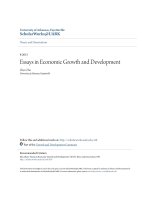Economic growth and economic development 445
Bạn đang xem bản rút gọn của tài liệu. Xem và tải ngay bản đầy đủ của tài liệu tại đây (122.2 KB, 1 trang )
Introduction to Modern Economic Growth
In fact, the competitive equilibrium is not in general Pareto optimal. The simplest way of seeing this is that the steady state level of capital stock, k∗ , given by
(9.9), can be so high that it is in fact greater than kgold . Recall that kgold is the golden
rule level of capital-labor ratio that maximizes the steady-state level of consumption
(recall, for example, Figure 8.1 in Chapter 8 for the discussion in Chapter 2). When
k∗ > kgold , reducing savings can increase consumption for every generation.
More specifically, note that in steady state we have
f (k∗ ) − (1 + n)k∗ = c∗1 + (1 + n)−1 c∗2
≡ c∗ ,
where the first line follows by national income accounting, and the second defines
c∗ as the total steady-state consumption. Therefore
∂c∗
= f 0 (k∗ ) − (1 + n)
∗
∂k
and kgold is defined as
f 0 (kgold ) = 1 + n.
Now if k∗ > kgold , then ∂c∗ /∂k∗ < 0, so reducing savings can increase (total) consumption for everybody. If this is the case, the economy is referred to as dynamically
inefficient–it involves overaccumulation. Another way of expressing dynamic inefficiency is that
r∗ < n,
that is, the steady-state (net) interest rate r∗ = R∗ −1 is less than the rate of popula-
tion growth. Recall that in the infinite-horizon Ramsey economy, the transversality
condition (which follows from individual optimization) required that r > g + n,
therefore, dynamic inefficiency could never arise in this Ramsey economy. Dynamic
inefficiency arises because of the heterogeneity inherent in the overlapping generations model, which removes the transversality condition.
In particular, suppose we start from steady state at time T with k∗ > kgold .
Consider the following variation where the capital stock for next period is reduced
by a small amount. In particular, change next period’s capital stock by −∆k, where
∆k > 0, and from then on, imagine that we immediately move to a new steady state
431









